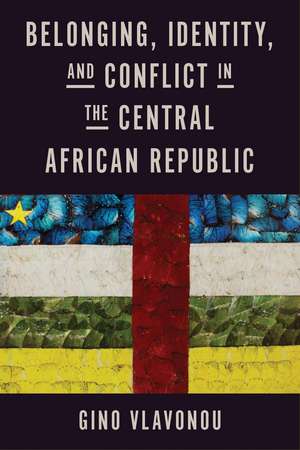Belonging, Identity, and Conflict in the Central African Republic
Autor Gino Vlavonouen Limba Engleză Hardback – 12 dec 2023
Focusing on violent struggles in the Central African Republic between 2012 and 2019, Gino Vlavonou explores the social practices, discursive strategies, and government policies that emerged in the relentless project of African state building. Conflict pitted Christian-animist communities, loosely organized as vigilante groups under the name anti-Balaka, against Muslim rebels known as the Séléka. Fighters of the anti-Balaka claimed that they were autochthonous, the “true Central Africans,” reframing their Muslim neighbors as foreigners to be expelled. While the country had previously witnessed episodes of violence, both peoples had lived together relatively peacefully and intermarried. The speed and ferocity with which identity was weaponized puzzled many observers. To understand this phenomenon, Vlavonou probes autochthony as a category of identity that differs from ethnicity in important ways. He argues that elites and ordinary citizens alike mobilize the language of original belonging as “identity capital,” a resource to be deployed. The value of that capital is lodged in what people say and do every day to give meaning to their identity, and its content changes across time and space.
Preț: 530.82 lei
Preț vechi: 689.38 lei
-23% Nou
Puncte Express: 796
Preț estimativ în valută:
101.57€ • 106.05$ • 84.06£
101.57€ • 106.05$ • 84.06£
Carte tipărită la comandă
Livrare economică 04-18 aprilie
Preluare comenzi: 021 569.72.76
Specificații
ISBN-13: 9780299345709
ISBN-10: 029934570X
Pagini: 256
Ilustrații: 2 b-w illus.
Dimensiuni: 152 x 229 x 20 mm
Greutate: 0.48 kg
Ediția:First Edition
Editura: University of Wisconsin Press
Colecția University of Wisconsin Press
ISBN-10: 029934570X
Pagini: 256
Ilustrații: 2 b-w illus.
Dimensiuni: 152 x 229 x 20 mm
Greutate: 0.48 kg
Ediția:First Edition
Editura: University of Wisconsin Press
Colecția University of Wisconsin Press
Recenzii
“This book convincingly demonstrates that claims to autochthony are only effective through othering and exclusion. It will be important reading for scholars studying the political, social, and economic dynamics of crisis and conflict and their effects on people’s everyday lives.”—Lotje de Vries, Wageningen University
“An impressively original, seminal, and ground-breaking work of exhaustive research and meticulous scholarship. . . . A welcome and exceptionally informative contribution.”—Midwest Book Review
“Vlavonou masterfully demonstrates what it means to mobilize autochthony as an identity capital. . . . Belonging, Identity, and Conflict in the Central African Republic is a magnificent book, which does a lot to shed light upon the implications of autochthony.”—African and Asian Studies
“A timely contribution to the study of autochthony. Vlavonou shows that autochthony need not be associated directly with land politics, even if it often is in other contexts. His thorough empirical work clearly illustrates how elites in the CAR mobilized autochthony to advance political agendas while non-elites used it to access economic spaces. This book will be important reading for both specialists on the Central African Republic and scholars of autochthony more broadly.”—H-Net Reviews
“The first multifaceted depiction. . . . [An] exceptional monograph.”—Africa Spectrum
“An impressively original, seminal, and ground-breaking work of exhaustive research and meticulous scholarship. . . . A welcome and exceptionally informative contribution.”—Midwest Book Review
“Vlavonou masterfully demonstrates what it means to mobilize autochthony as an identity capital. . . . Belonging, Identity, and Conflict in the Central African Republic is a magnificent book, which does a lot to shed light upon the implications of autochthony.”—African and Asian Studies
“A timely contribution to the study of autochthony. Vlavonou shows that autochthony need not be associated directly with land politics, even if it often is in other contexts. His thorough empirical work clearly illustrates how elites in the CAR mobilized autochthony to advance political agendas while non-elites used it to access economic spaces. This book will be important reading for both specialists on the Central African Republic and scholars of autochthony more broadly.”—H-Net Reviews
“The first multifaceted depiction. . . . [An] exceptional monograph.”—Africa Spectrum
“A smooth and engaging read, bursting with essential and compelling insights into the practices and policies of a country that deserves more attention.”
“[A] well-researched study.”
“Offers a novel and much welcome critical perspective. . . . [This book] is unique and stimulating contribution to the study of identity politics, post-colonial governance, and contemporary civil war with the potential of becoming a modern classic.”
Notă biografică
Gino Vlavonou is a program officer at the Social Sciences and Humanities Research Council of Canada (SSHRC-CRSH).
Cuprins
Contents
List of Illustrations
Acknowledgments
List of Abbreviations
Introduction
1 Autochthony without Land
2 Civil Society and Armed Actors on Becoming an Autochthonous
3 The Discursive Practices of Bozizé
4 Autochthony without Land, State Policy, and Mining
5 Autochthony, the Everyday and Dynamics in the Public Market
7. Conclusion: On Mobilizing Autochthony Without Land
Notes
References
Index
List of Illustrations
Acknowledgments
List of Abbreviations
Introduction
1 Autochthony without Land
2 Civil Society and Armed Actors on Becoming an Autochthonous
3 The Discursive Practices of Bozizé
4 Autochthony without Land, State Policy, and Mining
5 Autochthony, the Everyday and Dynamics in the Public Market
7. Conclusion: On Mobilizing Autochthony Without Land
Notes
References
Index
